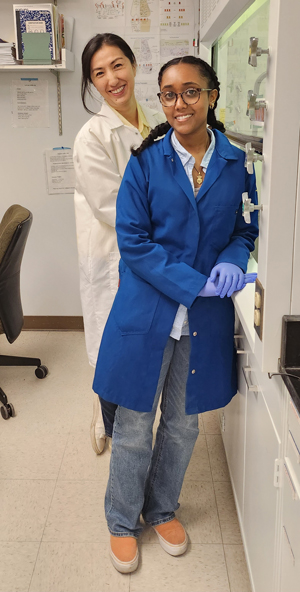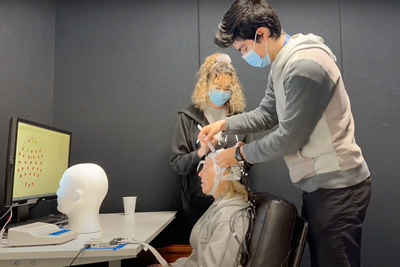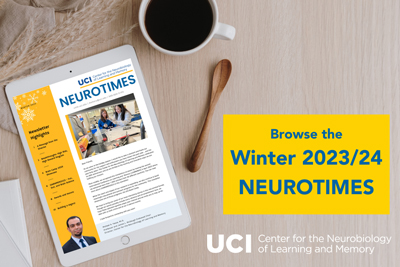Breakthroughs: CNLM High Risk, High Reward Pilot Grant Program
In 2022, the Center for the Neurobiology of Learning and Memory launched the High Risk, High Reward Pilot program that provides two $25,000 grants to help Center researchers advance our understanding of learning and memory while pursuing early stage and proof-of-concept research. Thanks to the generous support of CNLM donors, this program was able to fund two pilot projects. As we passed the one year mark, we followed up with the researchers to find out more about their projects and hear what is next for the teams.

Dr. Lulu Chen and graduate student Mulatwa Haile in the Chen Lab after recently publishing their groundbreaking research in Translational Psychiatry.
Investigating Neurexin-2 (Nrxn2)’s Role in Neurodevelopmental Disorders and Sleep Dysregulation
PI: Lulu Y. Chen (Anatomy and Neurobiology)
In the pursuit of unraveling the mysteries of neurodevelopmental disorders, Dr. Lulu Chen seeks to shed light on the connection between mutations in the gene Neurexin-2 (Nrxn2) and conditions like autism spectrum disorders (ASD) and epilepsy while also exploring its potential role in sleep disturbances. Preliminary findings in the Chen lab suggest that the absence of Nrxn2 may lead to heightened network activity resulting in spontaneous seizures and behavioral impairments, opening up fresh avenues for understanding the relationship between ASD and epilepsy.
The study also delves into the comorbidity between ASD and epilepsy with other neurodevelopmental disorders. Disorders like Fragile X syndrome, tuberous sclerosis complex, Timothy syndrome, and Phelan-McDermid syndrome, often accompanied by seizures, share a striking connection with ASD. Nrxn2 emerges as a potential link in these comorbidities, with the Nrxn2 mouse model offering insights into the biological pathways connecting these disorders.
Additionally, the gene Nrxn2 may be responsible for sleep disturbances often identified with ASD and epilepsy. Preliminary findings from continuous 24-hour video monitoring and EEG recordings in mice with Nrxn2 mutation suggest fragmented sleep patterns and disruptions in REM, non-REM sleep, and wake EEG brain waves. Further investigations are underway to decipher the molecular mechanisms behind these sleep irregularities by examining synaptic connections between neurons.
Dr. Chen and graduate student Mulatwa Haile published a paper titled “Conditional deletion of Neurexin-2 alters neuronal network activity in hippocampal circuitries and leads to spontaneous seizures” in Translational Psychiatry in March 2023. This publication marks the first investigation into the role of Nrxn2, whose mutations are implicated in autism and epilepsy.
Looking ahead, the Chen lab is preparing to submit their work to a peer-reviewed journal by January 2024. Additionally, Dr. Chen has submitted an NIH R01 grant application, building on the insights gained from the pilot award-supported research.
Learning While You Rest: Promoting Memory Consolidation with Audio-visual Stimulation
PIs: Susanne Jaeggi (Education), Jacky Au (Education), and Bryce Mander (Psychiatry)

Graduate student Ashley Manley and research assistant Luis Parada Ramirez set up the EEG cap on a volunteer.
This project's overarching goal is to investigate the potential benefits of a simple therapeutic tool—audio-visual stimulation—in mitigating age-related memory decline. This tool involves using headphones to deliver tones and a computer screen for visual flickers. If their research proves successful, this tool could become a widely accessible intervention, requiring only headphones and a computer.
In the past year, the team has successfully recruited 34 older adult study participants (aged 65-85) to engage in several in-person sessions where they received audiovisual stimulation while capturing their sleep data and completing sleep-related surveys.
With data collection nearly complete, the team is shifting its focus to data analysis and interpretation. They presented their initial findings at the Annual Conference of the Psychonomic Society in San Francisco in November. Depending on their results, they plan to seek further support from organizations like NIH to expand their project and test it on a larger scale.
What is most inspiring about this team is their ability to overcome challenges. Throughout this journey, the team encountered several set backs, from finding suitable lab space and equipment to adapting to unexpected changes and disruptions.
Thankfully, due to the dedication of their team, they were able to navigate these obstacles successfully.
With the support of the High Risk, High Reward Pilot grant, this pilot team is on the cusp of uncovering valuable insights into age-related memory decline. Stay tuned for more updates, as they continue to explore the mysteries of memory and aging.
Find out more about supporting High Risk, High Reward research.
Browse the Winter 2023/24 NeuroTimes
This article was featured in Winter 2023/24 NeuroTimes. You can read the entire edition by clicking on the link below.
>> Read Now

